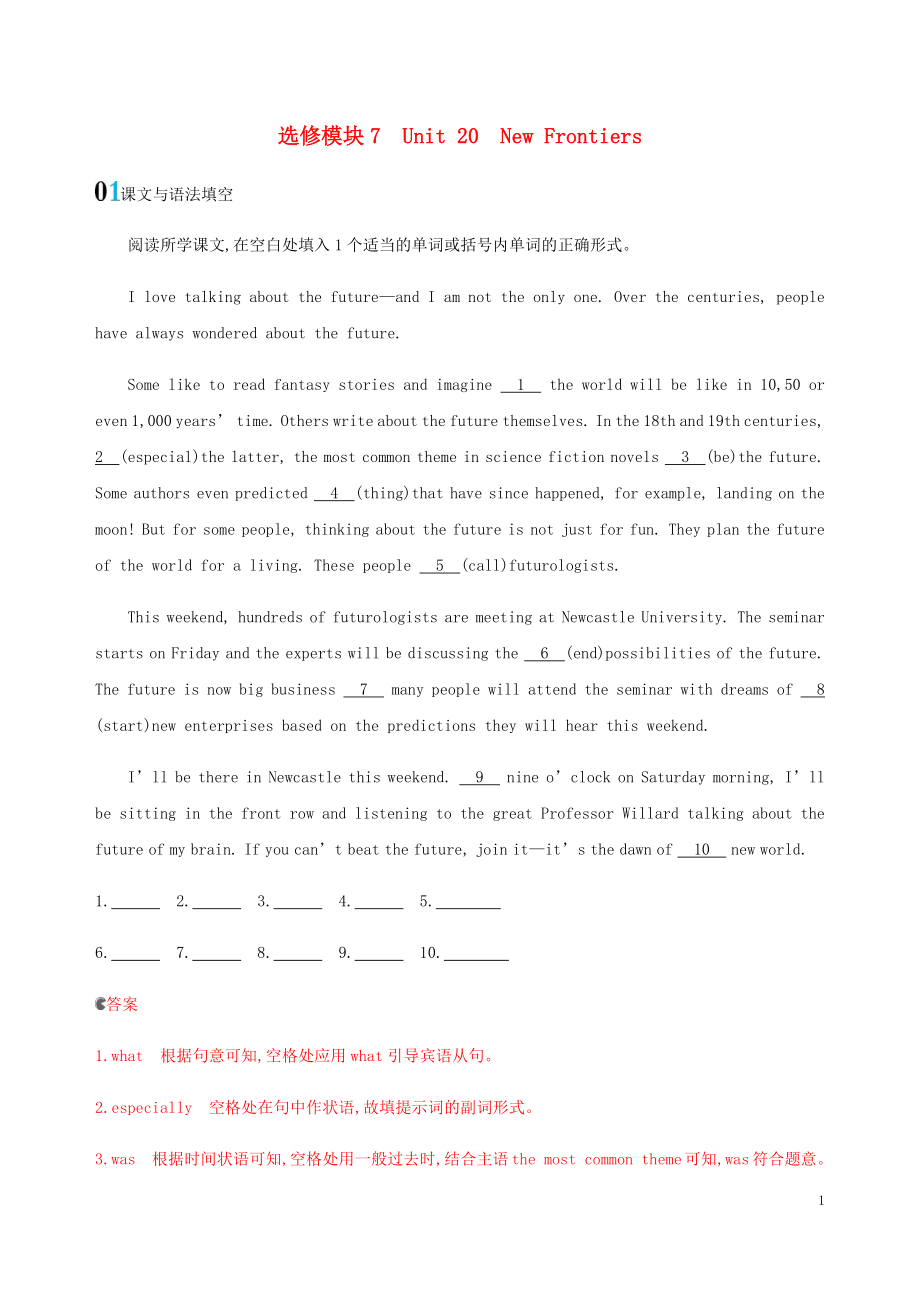《(新課標(biāo))2020版高考英語(yǔ)一輪復(fù)習(xí) 選修模塊7 Unit 20 New Frontiers單元提升 北師大版》由會(huì)員分享���,可在線(xiàn)閱讀���,更多相關(guān)《(新課標(biāo))2020版高考英語(yǔ)一輪復(fù)習(xí) 選修模塊7 Unit 20 New Frontiers單元提升 北師大版(7頁(yè)珍藏版)》請(qǐng)?jiān)谘b配圖網(wǎng)上搜索。
1����、選修模塊7 Unit 20 New Frontiers
課文與語(yǔ)法填空
閱讀所學(xué)課文,在空白處填入1個(gè)適當(dāng)?shù)膯卧~或括號(hào)內(nèi)單詞的正確形式。
I love talking about the future—and I am not the only one. Over the centuries, people have always wondered about the future.
Some like to read fantasy stories and imagine 1 the world will be like in 10,50 or even 1,000 yea
2����、rs’ time. Others write about the future themselves. In the 18th and 19th centuries, 2 (especial)the latter, the most common theme in science fiction novels 3 (be)the future. Some authors even predicted 4 (thing)that have since happened, for example, landing on the moon! But for some people, think
3、ing about the future is not just for fun. They plan the future of the world for a living. These people 5 (call)futurologists.?
This weekend, hundreds of futurologists are meeting at Newcastle University. The seminar starts on Friday and the experts will be discussing the 6 (end)possibilities of t
4��、he future. The future is now big business 7 many people will attend the seminar with dreams of 8 (start)new enterprises based on the predictions they will hear this weekend. ?
I’ll be there in Newcastle this weekend. 9 nine o’clock on Saturday morning, I’ll be sitting in the front row and list
5�����、ening to the great Professor Willard talking about the future of my brain. If you can’t beat the future, join it—it’s the dawn of 10 new world.?
1. 2. 3. 4. 5. ?
6. 7. 8. 9. 10. ?
答案
1.what 根據(jù)句意可知,空格處應(yīng)用what引導(dǎo)賓語(yǔ)從句。
2.especially 空格處在句中作狀語(yǔ),故填提示詞的副詞形式��。
3.was 根據(jù)時(shí)間狀語(yǔ)可知
6�、,空格處用一般過(guò)去時(shí),結(jié)合主語(yǔ)the most common theme可知,was符合題意。
4.things 空前無(wú)限定詞,結(jié)合語(yǔ)境可知,空格處應(yīng)用提示詞的復(fù)數(shù)形式�。
5.are called 主語(yǔ)是動(dòng)作的承受者,結(jié)合語(yǔ)境可知,空格處應(yīng)用一般現(xiàn)在時(shí)的被動(dòng)語(yǔ)態(tài)。
6.endless 空格處作名詞的定語(yǔ),結(jié)合語(yǔ)境可知,要填形容詞endless�����。
7.and 空格處前后是并列關(guān)系,根據(jù)語(yǔ)境可知,and符合題意�。
8.starting 介詞of之后應(yīng)該接動(dòng)名詞starting��。
9.At 表示在具體的幾點(diǎn),應(yīng)用介詞at��。
10.a world為可數(shù)名詞,在句中表示泛指,故填不定冠詞a
7����、。
課文與短文改錯(cuò)
根據(jù)課文內(nèi)容,對(duì)下面材料進(jìn)行修改��。文中共有10處語(yǔ)言錯(cuò)誤,每句中最多有兩處����。每處錯(cuò)誤僅涉及一個(gè)單詞的增加����、刪除或修改��。
If you had to choose most important discovery of the 20th century, you would have a real dilemma on you hands. In just 100 years, but the world changed completely. Amazed discoveries were made in medicine, communications or t
8�����、ransport, not to mention our knowledge of the world and space. Medical advances ranged by discovering the causes of diseases under microscopes to surgical procedures replacing diseased organs with donated ones.
Communications changed with the introduction of mobile phone and the way we correspond w
9����、ent from write letters to emailing. We started flying around the world and meanwhile, scientists figure out how to split the atom, previous thought to be the smallest particle of matter in the universe.
答案
第一段
1.第一句:∧most→the 構(gòu)成形容詞最高級(jí)形式的most之前應(yīng)加定冠詞the。
2.第一句:hands前的you→your 名詞hands之前應(yīng)用形容詞性物主代詞修
10�����、飾�。
3.第二句:刪除but 逗號(hào)前后并非并列的分句,故刪除but。
4.第三句:Amazed→Amazing 根據(jù)名詞discoveries可知,Amazed應(yīng)改為Amazing���。
5.第三句:or→and 根據(jù)邏輯關(guān)系和語(yǔ)境可知,or使用錯(cuò)誤,應(yīng)改為and�。
6.第四句:by→from 此處為固定短語(yǔ)“range from...to...”,故將by改為from。
第二段
7.第一句:phone→phones phone為可數(shù)名詞,在句中應(yīng)用復(fù)數(shù)形式�。
8.第一句:write→writing 介詞from之后應(yīng)用動(dòng)名詞writing。
9.第二句:figure→figure
11���、d 根據(jù)上下文語(yǔ)境可知,此處應(yīng)用一般過(guò)去時(shí)���。
10.第二句:previous→previously 此處應(yīng)用副詞previously作狀語(yǔ)。
話(huà)題知識(shí)與寫(xiě)作
(Ⅰ)用所學(xué)詞匯����、短語(yǔ)或句型翻譯下列各句
1.地震發(fā)生后不久,營(yíng)救隊(duì)首先到達(dá)了災(zāi)區(qū)。
?
?
2.損失評(píng)估公布后,源源不斷的捐款被送到了災(zāi)區(qū)��。
?
?
3.捐款被用來(lái)幫助那些處于饑餓狀態(tài)的人們����。
?
12��、
?
4.這時(shí),每個(gè)人都意識(shí)到?jīng)]有歧視,人人生而平等�����。
?
?
5.毫無(wú)疑問(wèn),在災(zāi)難面前人們表現(xiàn)出的大愛(ài)可彌補(bǔ)一切矛盾��。
?
?
(Ⅱ)將以上句子連成一段語(yǔ)言流暢、邏輯嚴(yán)密的短文
?
?
?
?
13�����、
答案
(Ⅰ)1.Shortly after the earthquake, rescue teams first got to the disaster area.
2.After the declaration of assessment of the loss, constant donations were sent to the disaster area.
3.The donations were used to assist the people in starvation.
4.On this occasion, everyone was awar
14�、e that there was no discrimination and that everyone was born equal.
5.There is no doubt that the great love shown in the face of disaster can make up for all the conflicts.
(Ⅱ)
Shortly after the earthquake,rescue teams first got to the disaster area. After the declaration of assessment of the l
15、oss, constant donations were sent to the disaster area to assist the people in starvation. On this occasion, everyone was aware that there was no discrimination and that everyone was born equal. There is no doubt that the great love shown in the face of disaster can make up for all the conflicts.
16�����、
單元詞匯拓展速記
“-er”(n.)詞塊
advertiser廣告商
astronomer天文學(xué)家
barber理發(fā)師
butche屠夫;肉商
cleaner清潔器;清潔工人
consumer消費(fèi)者
container容器
controller管理者,控制者,指揮者
counter柜臺(tái)
customer顧客
dealer經(jīng)銷(xiāo)商,商人
drummer鼓手
explorer探險(xiǎn)家
hacker電腦黑客
hunter獵人
interpreter譯員,口譯者
laughter笑;笑聲
lawyer律師
marcher游行者,行進(jìn)者
painter畫(huà)家;油漆匠
17���、
partner合作者,搭檔
performer表演者
photographer攝影師
porter行李搬運(yùn)工
poster海報(bào)
presenter節(jié)目主持人
programmer電腦程序編制員
racer賽車(chē)手
receiver接收者
reporter記者,通訊員
settle移民;殖民者
sharpener卷筆刀
shopkeeper店主
smoker吸煙者
taxpayer納稅人
teenager青少年
traveller旅行者,旅客
typewriter打字機(jī)
waiter(餐廳)服務(wù)員
writer作者,作家
youngster年輕人,少年
7
 (新課標(biāo))2020版高考英語(yǔ)一輪復(fù)習(xí) 選修模塊7 Unit 20 New Frontiers單元提升 北師大版
(新課標(biāo))2020版高考英語(yǔ)一輪復(fù)習(xí) 選修模塊7 Unit 20 New Frontiers單元提升 北師大版

